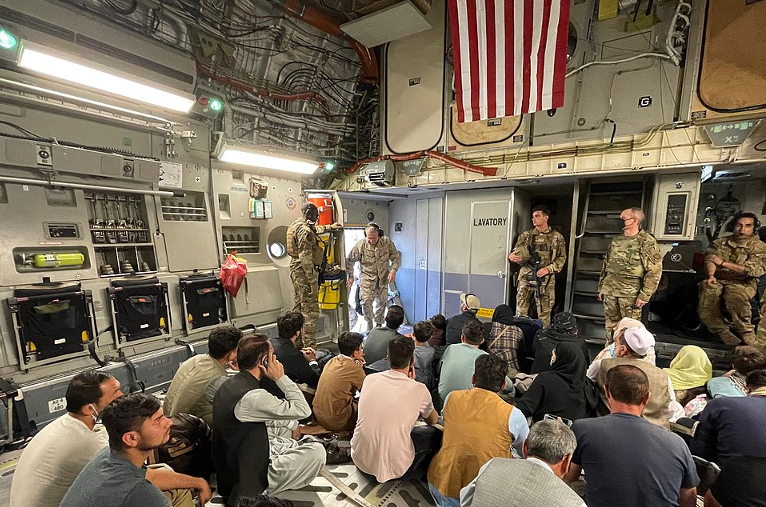These are some of the things I have been looking at this week as I have been making sense of events in Afghanistan.
TL:DR: The Americans failed at ‘nation-building’ because they spent all the money on the military. The British delusions of being an independent ‘global’ power have been shown up for what they are. And the people who pay the price for this are the Afghanis, still living in one of the poorest states in the world.
#1: Twenty years on
It’s hard to tell if this is the best of timing or the worst, but the US Special Inspector General for Afghanistan Reconstruction (SIGAR) published their 20-year review (pdf) a few days ago.
Here’s a section from the executive summary:
The U.S. government has now spent 20 years and $145 billion trying to rebuild Afghanistan, its security forces, civilian government institutions, economy, and civil society. The Department of Defense (DOD) has also spent $837 billion on warfighting, during which 2,443 American troops and 1,144 allied troops have been killed and 20,666 U.S. troops injured. Afghans, meanwhile, have faced an even greater toll. At least 66,000 Afghan troops have been killed. More than 48,000 Afghan civilians have been killed, and at least 75,000 have been injured since 2001—both likely significant underestimations.
The extraordinary costs were meant to serve a purpose—though the definition of that purpose evolved over time. At various points, the U.S. government hoped to eliminate al-Qaeda, decimate the Taliban movement that hosted it, deny all terrorist groups a safe haven in Afghanistan, build Afghan security forces so they could deny terrorists a safe haven in the future, and help the civilian government become legitimate and capable enough to win the trust of Afghans. Each goal, once accomplished, was thought to move the U.S. government one step closer to being able to depart.
While there have been several areas of improvement—most notably in the areas of health care, maternal health, and education—progress has been elusive and the prospects for sustaining this progress are dubious.
‘Lessons’ ‘learned’
On his Memex 1.1 blog , John Naughton listed the ‘lessons learned’ in the report:
“1. Strategy: The U.S. government continuously struggled to develop and implement a coherent strategy for what it hoped to achieve.
2. Timelines: The U.S. government consistently underestimated the amount of time required to rebuild Afghanistan, and created unrealistic timelines and expectations that prioritized spending quickly. These choices increased corruption and reduced the effectiveness of programs.
3. Sustainability: Many of the institutions and infrastructure projects the United States built were not sustainable.
4. Personnel: Counterproductive civilian and military personnel policies and practices thwarted the effort.
5. Insecurity: Persistent insecurity severely undermined reconstruction efforts.
6. Context: The U.S. government did not understand the Afghan context and therefore failed to tailor its efforts accordingly.
7. Monitoring and Evaluation: U.S. government agencies rarely conducted sufficient monitoring and evaluation to understand the impact of their efforts.”
Military outlays
Actually, when you look underneath the numbers, as Jeffrey Sachs did at Project Syndicate, the story gets worse. Maybe you wouldn’t expect a Pentagon report—as SIGAR’s is—to take too big a picture. But when you do the reasons for American failure become starkly clear. The US invested close to $1 trillion (an eye-watering $946 billion, according to SIGAR) in Afghanistan between 2001 and 2021. And almost of it went on security:
Of that $946 billion, fully $816 billion, or 86%, went to military outlays for US troops. And the Afghan people saw little of the remaining $130 billion, with $83 billion going to the Afghan Security Forces. Another $10 billion or so was spent on drug interdiction operations, while $15 billion was for US agencies operating in Afghanistan. That left a meager $21 billion in “economic support” funding. Yet even much of this spending left little if any development on the ground, because the programs actually “support counterterrorism; bolster national economies; and assist in the development of effective, accessible, and independent legal systems.”
In short, less than 2% of the US spending on Afghanistan, and probably far less than 2%, reached the Afghan people in the form of basic infrastructure or poverty-reducing services.
Flatpack democracy
In his piece, Naughton continues: “Further on [in the SIGAR report] there are other interesting reflections on the general idea of trying to helicopter flatpack-democracy kits into medieval deserts.”
“1. They are very expensive. For example, all war-related costs for U.S. efforts in Afghanistan, Iraq, and Pakistan over the last two decades are estimated to be $6.4 trillion.
2. They usually go poorly.
3. Widespread recognition that they go poorly has not prevented U.S. officials from pursuing them.
4. Rebuilding countries mired in conflict is actually a continuous U.S. government endeavor, reflected by efforts in the Balkans and Haiti and smaller efforts currently underway in Mali, Burkina Faso, Somalia, Yemen, Ukraine, and elsewhere.
5. Large reconstruction campaigns usually start small, so it would not be hard for the U.S. government to slip down this slope again somewhere else and for the outcome to be similar to that of Afghanistan.”
Systemic challenges
The SIGAR report’s conclusion—where the above five points are listed—also includes this revealing paragraph:
This report raises critical questions about the U.S. government’s ability to carry out reconstruction efforts on the scale seen in Afghanistan… (A)fter 13 years of oversight, the cumulative list of systemic challenges SIGAR and other oversight bodies have identified is staggering. As former National Security Advisor Stephen Hadley told SIGAR, “We just don’t have a post-conflict stabilization model that works. Every time we have one of these things, it is a pick-up game. I don’t have confidence that if we did it again, we would do any better.”
And maybe that’s the problem of looking at things through a military lens. Jeffrey Sachs has an idea of some of the things you could do, if you really wanted to do it better:
The US should never have intervened militarily in Afghanistan – not in 1979, nor in 2001, and not for the 20 years since. But once there, the US could and should have fostered a more stable and prosperous Afghanistan by investing in maternal health, schools, safe water, nutrition, and the like. Such humane investments – especially financed together with other countries through institutions such as the Asian Development Bank – would have helped to end the bloodshed in Afghanistan, and in other impoverished regions, forestalling future wars…
In the aftermath of the fall of Kabul, the US mass media is, predictably, blaming the US failure on Afghanistan’s incorrigible corruption. The lack of American self-awareness is startling.
#2. British delusions
Michael Clarke, at the RUSI site, suggested that the collapse of the Afghanistan state represented some ugly truths for Britain’s sense of its geopolitical place in the world:
One of the most unpalatable may not emerge very easily. The fact is that for two decades UK national leaders pretended, to themselves as much as to everyone else, that they were enacting a national strategy for Afghanistan. In reality, they were operating little more than the UK’s tactics within a US strategy over which they had next to no influence.
This dawning realisation—the President didn’t even call—may have been one of the reason for the anger directed at the government from all sides of the House in the Commons. And it leaves a bit of a gaping hole in the government’s post Brexit Britain story:
All of this is another tragedy for Afghanistan and a sobering story for the UK as it embarks on its ‘Global Britain’ future in the 2020s. It marks the end of the UK’s fourth Afghan War, the first of which began in 1839. …. In this fourth Afghan war, there were no battlefield defeats – indeed, the UK enjoyed tactical success throughout – but as is painfully evident, there has been a complete failure to achieve strategic objectives.
Easily fooled
As Clarke notes, there’s also a big gap between the Afghanistan story and all of the bright and shiny doorknob polishing statements (my phrase, not his) made about Britain’s new global role in the Integrated Review:
The UK’s Afghanistan experience demonstrates none of this. Instead, it speaks to a generation of political leaders who have too easily fooled themselves that being Washington’s most reliable military ally constitutes in itself an effective national strategy. Such a relationship may be one element of an effective strategy, but it cannot simply be the strategy.
Academic Peter Sloman wrote a short Twitter thread that made a related point about the image of the military in Britain’s projection of itself:
Since the Falklands War, military effectiveness has been central to a broadly conservative narrative of Britain as a post-imperial state which ‘punches above its weight in the world’.
Maybe not any more.
Big strategic questions
But there are bigger questions here. One of the many dogs that didn’t bark during the Brexit campaign was about Britain’s global role. The historian Robert Saunders reposted a piece from last year that raised these questions and put them into a historical context:
For a whole generation of politicians after 1945, the big challenge was to adapt to the contraction of British power: the fact that Britain was losing its global empire, its colonial markets and its control of the sea lanes. Joining the EEC was a way of responding to that challenge: to a fundamental shift in Britain’s options. It may have been the wrong response – that is an entirely legitimate argument – but it recognised that the status-quo could not be sustained.
The danger of the history propagated by Johnson, Rees-Mogg and their ilk is that it dodges that challenge. In writing a history of Britain as a small power, it pretends that nothing has changed: that a nation stripped of its colonies, its industrial power and its control over global finance has the same options today as in the age of its pre-eminence. That means that we are not being serious about the choices in front of us. For the big strategic questions have not gone away. What is Britain’s economic future, as a medium-sized economy in a world dominated by China and the United States? What is Britain’s diplomatic role, in a world without an empire?
#3. The forever war
But that’s enough about us. 1854 had a recent piece about the French photographer Stephen Dupont, who has been documenting the country for a quarter of a century:
Mostly I feel for the people of Afghanistan. I fell in love with the country because I felt for the people, and it breaks my heart to know that they’re going to be sacrificed, like lambs to the slaughter.”
As our interview draws to a close, I ask Dupont for his favourite anti-war photograph. It’s a black and white image from 2005 , during his time with the US marines in Kunar province. A young boy rests nonchalantly against a mud hut. He is staring intensely at an armed US marine, but he’s not intimidated. Instead there is an unmistakable look of fierce defiance in his eyes. “He’s not scared, he’s just fucking angry and he’s only about 12 years old,” Dupont says. “He’s saying: ‘Fuck you and your big military machine. This is our country. This is my village, this is my home.’”
Teaser photo credit: US soldiers with Afghans evacuating Hamid Karzai International Airport on 17 August, after the Taliban captured Kabul. By Capt. William Urban/U.S. Central Command Public Affairs/U.S. Navy – https://www.dvidshub.net/image/6787574/centcom-arrives-hamid-karzai-international-airport, Public Domain, https://commons.wikimedia.org/w/index.php?curid=108857056





